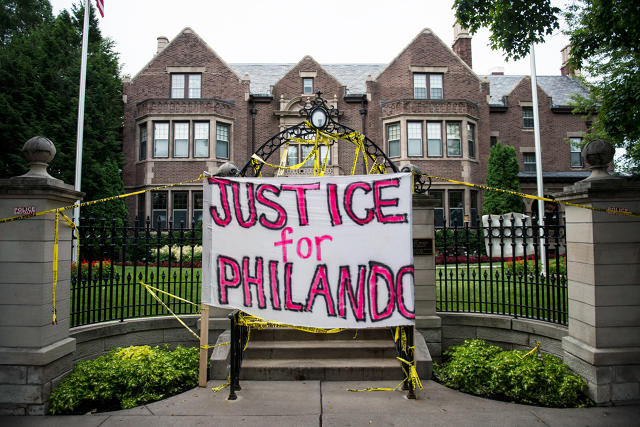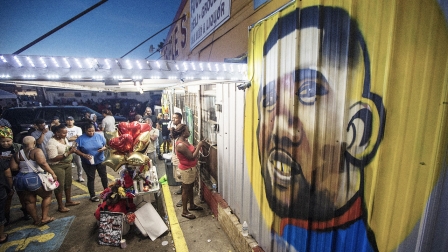Learn, Vote, And Get In The Streets: What You Can Do Today To Help End Police Violence
Twice this week, the police have killed black men in shocking shootings that were filmed and distributed online, one on Facebook Live—and the horrible violence continued with the tragic shootings of police officers in Dallas. You may or may not have had the stomach to watch these deeply upsetting and graphic videos, but the stories from them are everywhere: Philando Castile, killed in Minnesota during a routine traffic stop as his girlfriend said he was reaching for his license, and Alton Sterling, shot dead while already pinned to the ground by officers. These videos have sadly put new energy into the movement that is harnessing the outrage over extreme police violence toward people of color and turning it into momentum for reform and accountability.
BlackLivesMatter became the nationally prominent voice of the police reform movement after the shooting of unarmed Michael Brown in Ferguson, Missouri, in 2014, but the deaths didn’t stop, far from it. True reform—which involves developing new systems of police accountability, training, and codes of conduct—will take a long, sustained movement of people pushing for change.
If you are outraged—no matter the color of your skin or however you identify—don’t sit back and let it wash over you. Here’s a guide to several ways you can participate in what is becoming this generation’s new civil rights movement.
Listen To Those Most Affected By Police Violence
Black people are three times more likely to be killed by the police than white people, and 30% of black victims of police shootings are unarmed (as opposed to 19% of white people). Fewer than one in three black people killed by police were actually suspected of a violent crime and suspected to be armed, according to the research collaborative Mapping Police Violence.
This is why people of color are leading this movement, and in order not to replicate patterns of oppression, it is important to directly support black voices and organizations that are led by them. If you are white, acknowledge that you can’t know what it is to grow up feeling unsafe in your own community because of the color of your skin. Whatever you do, don’t make it about you or bombard your black friends with questions. Put the effort in to learn it on your own. Need a place to start? Try Michelle Alexander’s The New Jim Crow, which explains powerfully and succinctly all the systems the state has created to criminalize black people in this country.
There are also organizations leading the movement for black lives that you might consider getting involved with, donating to, and following on social media—two lists are here and here. Philando Castile’s sister has also set up a GoFundMe page here and one that benefits Alton Sterling’s family is here.

Speak Up In Your Own Life
With police violence in the news and with the casual racism displayed by one 2016 presidential candidate, many hear the voices of people in our communities—often friends or family—who are offended that the BlackLivesMatter movement doesn’t focus on #AllLivesMatter and who fundamentally misunderstand the long history of police violence and bias directed specifically toward people of color. If you are white, examine your own life and then stand up—whether on social media, at the dinner table, at a community meeting, or in your local newspaper—to challenge myths and fallacies used to perpetuate white supremacy. Not everyone will listen, and it will sometimes be tense, but that is how these high-profile deaths like Sandra Bland, Freddie Gray, Tamir Rice, and Walter Scott will have meant something for reforming the system.
White people have an opportunity, especially, to educate other white people and take some of the burden off black people constantly having to explain the issue. There are a growing number of “ally” organizations that are gathering people who want to support racial justice and police reform, but who understand that it is not their place to take center stage. The group Showing Up For Racial Justice is working with white people around the country and has tool kits on how to organize in your community. I am a member of a group called Jews for Racial and Economic Justice that does this extremely well, organizing rabbis and Jews of all colors to advocate for reforms in New York City. It is part of a broader coalition here in New York called Communities United For Police Reform: There is power in speaking as many different people all in one voice.
You can even try to get your company to speak out, as the ad agency Wieden Kennedy did today.
Film the Police, And Know Your Rights When You Do It
We know about Eric Garner’s chokehold death because an observer turned their camera on. Turn yours on, too. Read about your rights to film the police and know how to stay safe doing so. A good resource for this is CopWatch, a grassroots movement that has made a practice of filming police encounters around the country, both to hold police accountable and as a deterrent against bad behavior. If you see a police encounter you consider unjust or abusive, you can try to obtain information from the police officer or the civilian while taking care not to escalate the situation. Report what you see. CopWatch NYC has an excellent page where you can read more about how to go about filming the police.
Know What You’re Asking For—And Get Out In The Streets
From citizens oversight committees empowered to investigate and discipline police to body cameras and improved monitoring of how and when individual police officers are using force, there are dozens of policies and proposals for how police departments can improve. You can read more about these ideas on the ACLU’s community action manual for fighting police abuse and Campaign Zero’s detailed guide to 10 categories of interventions that can be made.
The protest movement for police reform is growing. In this age of digital activism, still nothing is more powerful than being present—and remaining nonviolent. In the middle of the night this week, in the immediate aftermath of Philando Castile’s death, protesters had already gathered at the governor’s mansion in Minnesota, and by the next day, the governor was calling for a U.S. Justice Department investigation into the shooting. It’s important that people of all races show up—having white people at protests can help protect others and deter an overaggressive police response.
Join a march or sit-in or rally locally or organize your own. Protests are already springing up in major cities (July 10, 2016), today, and over the weekend, such as one that shut down Times Square in New York on Thursday evening. Seek out local organizations to find out what is being planned in your areas.
Vote Locally (Most Important) And Nationally For Candidates That Support Reform
Police reform is a local issue as much as it is a national one. Make sure your city representatives are making police reform a priority, and if they’re not—demand that they do. In this year’s elections, refuse to vote for the candidates that do not make police reform a priority for their platform.
An example of a politician who has made police reform a priority—to provide just one positive role model—is Jumaane Williams, a city councilman from Brooklyn who is an outspoken advocate on the issue. Look for local examples of politicians like him and make sure they have all the support they need.
Have something to say about this article? You can email us and let us know. If it’s interesting and thoughtful, we may publish your response.
Fast Company , Read Full Story
(32)


